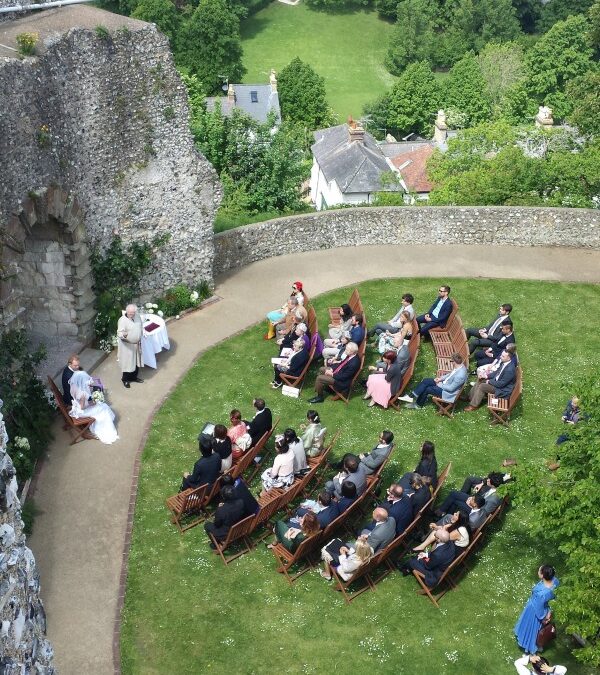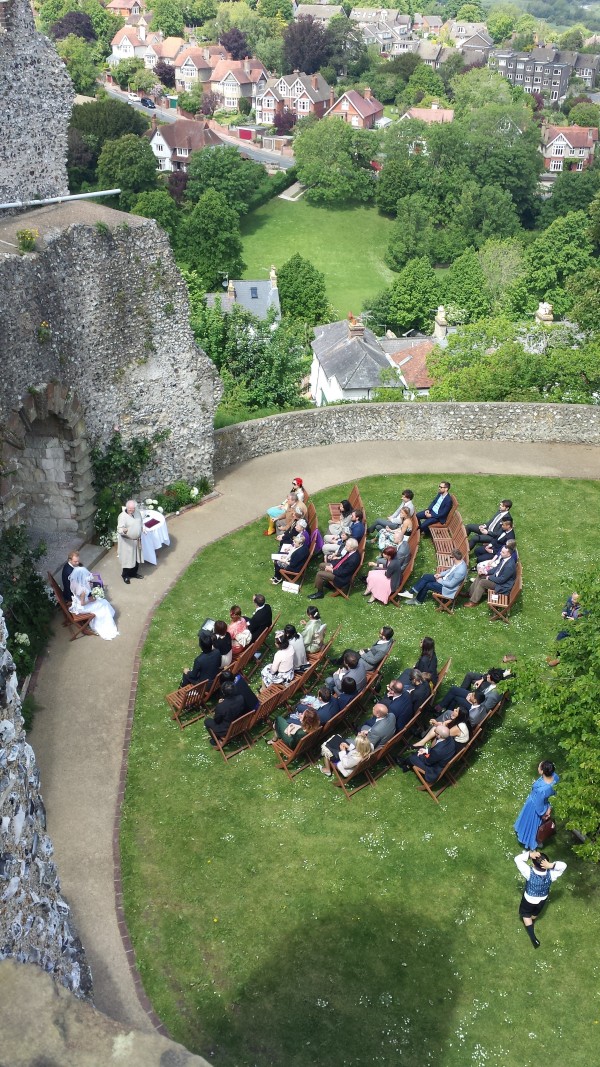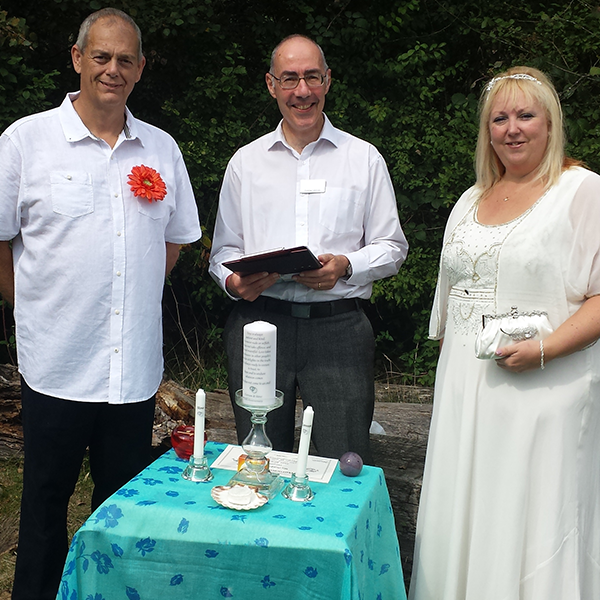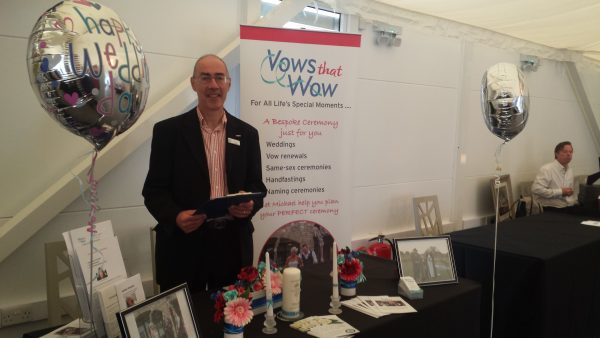
by Michael | Oct 31, 2017 | Blog
The idea of a Halloween wedding seems to be catching on nowadays. As with other unconventional ceremonies.
As a civil celebrant, I’ve put together, and officiated at, a few unusual ones – but I haven’t done a Halloween wedding as yet.
Why a Halloween wedding?
Why on earth would people adopt the Halloween theme of ghoulies and ghosties for the biggest day of their life?
One reason is that a growing number of people nowadays don’t see why a wedding should be regarded as a merely solemn affair.
You may prefer to include humour (to reflect your own personalities), and your choice of music can be eclectic, to say the least. You can choose your venue, and that might be quite way-out (literally too!) – under water, in a hot-air balloon, on a mountain top, wherever your imagination might take you.
Is there anything wrong with freedom of choice for such a major event?
Make your choice
So why not choose an unconventional theme for your wedding? Of course, you aren’t limited to Halloween. You can go Goth. Or Star Wars or Elvis, or wherever your imagination suggests. Such a theme will bring smiles to the faces of all but the most dyed-in-the-wool sourpusses; it’s a peephole into both your personalities. Why not extend it to the Dark Side, if that’s what turns you both on?
Notice, by the way, that I say “both”. Whatever you do, don’t try and surprise your partner on a subject as big as this!
The important thing to realise is that you are not restricted to a religious wedding in a church, say, if you don’t want it. You almost certainly won’t be allowed a themed wedding at the registrars’ service. However, you can have your theme at a civil celebrant-led ceremony, and, depending how serious etc. you want to be, you may be able to combine it with elements from other cultures etc. Remember that it is your big day, and your wishes should be paramount.
Well, if I can help you further, please give me a call or knock loudly on my coffin! And have a happy Halloween!

by Michael | Oct 17, 2017 | Blog
Wedding etiquette has changed in the last few years. Traditional ceremonies are no longer the norm.
Couples are often paying for their wedding themselves, rather than relying on their parents. This means they have some independence, and can choose which elements to include. That allows them to change a few things.
Some may be remarrying. They may want to find ways of including children (from the first marriage or the new relationship) and/or other people in their big day. That’s not in the (traditional) script.

The Ceremony
Of course, you are welcome to keep to the old ways for your wedding. However, there are some areas where there is room to manoeuvre, if you prefer.
Bride and groom don’t have to wait till she walks down the aisle to see each other on the day. This is pure superstition. So ignore it, if you want. Indeed, if the ceremony starts in the late afternoon or evening, you might well decorate the venue together beforehand. And why shouldn’t you walk down the aisle at the start, hand-in-hand, if you so choose?
You don’t need a procession at the start (or end) of the ceremony. As couples are marrying later these days, parents might not be around or be fit enough to escort the bride down the aisle. Or maybe it’s a second marriage, and that simply wouldn’t feel appropriate?
Brides do ask brothers, sisters or mothers to accompany them on this walk – or they may even do it on their own.
Bridesmaids usually follow the bride in the UK. However, this is reversed in the US, and, even as a true Brit, I feel there’s a case for that.
Other elements
If you’re paying for the wedding, you should be able to choose who you want as your guests. Including whether it should be child-free.
For the reception, don’t feel obligated to have a top table (or even a sit-down silver-service meal). You can have a table for bride and groom, maybe with two extra chairs for people to ‘drop by’. Depending on the size of the affair, you could even dine as though at a medieval banquet, with everyone at a long table.
Have table names, rather than numbers, so people don’t get huffy because they’re at a “low” table.
Speeches don’t have to take place after the meal (or part-way through it). It might help nervous speakers to get these over with before the meal, so all can enjoy the food and drink! To avoid riots from hungry/thirsty guests, make sure speakers are given a time limit beforehand.
Nowadays, brides may well deliver a speech themselves. Fortunately, this wasn’t the case when I got married, but it is changing nowadays!
As a civil celebrant, it would be remiss of me not to mention that the ceremony can be personalised. Apart from including such things as the couple’s own vows or their story, there is a choice of rituals that can be used to beautify and individualise the occasion.
I am more than happy to advise on ways to make your ceremony stand out – whether traditionally or with a modern slant.
by Michael | Oct 10, 2017 | Blog
The idea of life-time funeral eulogies doesn’t, at first sight, make a lot of sense. Why would you have a eulogy when still alive? What’s the point?
A good turn
You may not care much what happens at your funeral. Once you’re dead, that’s probably it. Let your family work out what they want to include and exclude, can’t they?
However, for the next-of-kin, quite a lot has to happen – normally, in a fairly short length of time (about 10 days). This includes the legal bits (obtaining the medical certificate and then registering the death). It probably also includes organising the funeral itself and the reception or wake.
Then, ordinary life still has to go on. And, more significantly, the next-of-kin may well be in a state of shock – it could be grief, anger, bewilderment, depression, resentment – and that makes the whole process more traumatic and difficult.
What if the deceased (or the family) had already planned the funeral service – or, at least, the eulogy? Then there would be no doubts about how religious the service should be, or who should participate. This would resolve awkward questions – and avoid disagreements and arguments at such a difficult time.
If all this were already settled, what a good turn that would prove to be for the next-of-kin!
Control
One other reason why I, as a civil celebrant, sometimes get asked to write a lifetime funeral is because the client is very definite about what they want for the big day. Religion is a huge factor in this – they may absolutely reject the idea of mentioning God, or they want a jolly celebration of life with their own choice of music, say, or readings.
If I get asked to write a lifetime eulogy, then the client can be in control of what goes in – and what is omitted! This way, the facts are almost guaranteed to be right (though sometimes a little nuanced!), and an appropriate picture is painted. The tone can be chosen and any rituals specified. The venue can also be specified.
It has to be noted that what you choose is not legally enforceable. You can leave instructions with the will, but these may not be opened in time. Your wishes may be ignored. It is best to inform next-of-kin of your wishes (and leave a copy with them). It’s even better if you discuss all this with them first, so they are ‘on side’ when the time comes!
Added benefit
When I started out as a funeral celebrant, I decided to write a eulogy about myself, by way of practice. What I discovered was that it was a useful exercise for another reason.
By writing out what I had achieved in my life, I was forced to consider more deeply what I had always taken for granted.
I have always had some problems with self-esteem. By actually describing what I had done in my life, I came to realise that I had done a few things that I had good reason to be proud of. That really helped my self-development.
I would therefore recommend to anyone that they go through this process. They can do it themselves, or invite a civil celebrant to ask the necessary questions and put it together for them.
It may well help their self-esteem, but it may also prove to be a benefit for their next-of-kin and, of course, ensure that what they want to emerge from their life is what is revealed publicly.
For advice on any of the above issues, Michael would be delighted to help.
Top picture: Aaron Burden

by Michael | Oct 2, 2017 | Blog
I’m sure I don’t need to point out that weddings these days can be extremely expensive! We can easily be talking £20,000 +. Cutting wedding costs sounds a wonderful idea, but how practical is it?
Of course, much depends on what your budget is. In addition to the sheer quantity of suppliers you may want to hire, be aware that some put their prices up as soon as they know it’s a wedding!
Are there any short cuts you can take (apart from, say, looking for a second-hand wedding dress on e-Bay?!)?
It’s not easy to be draconian. And you don’t want to spoil your wedding either for yourselves or for your guests.
Incidentally, cutting down on the guest list is a good way to cut costs!
Maybe you decide not to bother with a limo, but you do want to be sure of punctual and comfortable rides on the day.
Bargaining with suppliers is sometimes a possibility. If you don’t feel comfortable doing that, here are some other suggestions.
Time of day
Even if you’re choosing the Dorchester or equivalent for your reception, you might be able to get a better deal, if you hold your ceremony at lunchtime, rather than in the evening.
Date
Another good way of saving money (not just with the venue) is to marry out of season. Suppliers want work year round, and they can be faced with yawning gaps between October and May. Therefore, they may look sympathetically at (or even spontaneously offer) a reduced rate. If you’re a good haggler, you may even manage to improve on these!
Note that reductions should not be expected at certain festivals, especially Christmas and Valentine’s Day.
Using flowers that are in season is another way to cut costs.
And consider weekdays (although that may have issues for employed guests). That’s normally cheaper.
Catering
There are ways of reducing this major cost. Although it would have to be well-organised, a buffet will be cheaper than a silver-service meal. Fewer staff are likely to be involved, so costs should be less.
You may well offer canapés and drinks. Prosecco is increasingly accepted in place of champagne, and this normally works out considerably cheaper.
You should provide a generous amount of wine and soft drinks to accompany the meal. Once that is over, I would suggest operating a cash bar. (It’s worth preparing guests for this when the invitation is sent out!)
Cup cakes, rather than a wedding cake, can be another acceptable way to save money.
Decor
Whether or not you have a theme, this is an important area. If you are holding a small affair, you may feel able to DIY. Be absolutely sure that you know what you’re doing, and get prepared well in advance!
Otherwise, discuss costs with your supplier at the outset, and ensure you are in control.
Entertainment
Of course, the scale and cost of this aspect will be down to you. It is worth getting referrals from people you know before you book anybody, and do ensure you understand their Ts & Cs.
Planners and Celebrants
If you decide to use a planner, it will obviously cost you more – but consider the peace of mind she will give you! Similarly, don’t cut corners with your celebrant. Ensure you see testimonials and speak to your supplier beforehand so that you have confidence in them on the day. You do want to feel at ease with the person who will marry you!
Your wedding is – or should be! – the most important day of your life. You want to get it right. Yes, you pay for what you get, but, as you can see, there are some ways to cut a few corners successfully, without compromising on quality.

by Michael | Sep 26, 2017 | Blog
Attending your first wedding fair can be pretty daunting.
What do you want to find out? Who do you need to speak to? How are you going to avoid all those stall-holders vying for your attention? What are you expecting to get out of the visit?
National or local fair?
Each wedding fair is different. You may choose to go to a huge national event (such as the National Wedding Show), where everything is on a vast scale. It will be noisy, busy, pressurised and demanding; however, you can expect every sort of supplier there, so you may possibly be able to resolve all your concerns on the spot.
Alternatively, you can attend smaller wedding fairs. They are usually organised by a wedding planner or else by the venue, often a hotel licensed for weddings. Attendance will vary, but, unlike thousands for a national fair, hundreds – or just a hundred, or even fifty– visitors will typically pass through in the day.
There may – or may not – be a bridal fashion parade as part of the event. If you choose well, you may get offered a drink and canapés on the house, which is always nice. There’s normally a ‘goody bag’ too.
By the way, the same wedding fair will not be the same this time as it was last time around. Weather, different stall-holders, punters – anything – may affect the atmosphere.
A national show will offer a vast array of photographers, cake-makers, florists etc. to choose from; however, you can expect a (much smaller) choice of suppliers at the local wedding fairs. Sometimes, these are vetted by the host venue, but not necessarily.
At a national event, where they will be crowds, you may not be given the time to ask the questions you want addressed. (Of course, you can take a card and contact the supplier later.) At a local event, you should get the chance to have a reasonably undisturbed chat with the stall-holder.

How do I make the most of a fair?
Your expectations will depend on your reasons for attending a show. In other words, if you’ve just got engaged and this is your first fair, you’re probably looking for ideas only at this stage. A more seasoned visitor may be targeting certain suppliers, and can be pretty precise about what he/she needs to find out.
Either way, don’t be bamboozled, especially when you arrive. You may find that the room or rooms are large, animated, possibly with flashing lights etc. and music playing. The room is meant to be a feast for the senses – and the number and variety of stall-holders adds to it. Imagine a middle-eastern bazaar, and you’ll get the picture.
If you can come prepared (even with notes) as to what you want and need, you can make the most of the fair. Suppliers will try and entice you to stop at their stall (either by engaging you in conversation or by offering a freebie). Don’t do what some people do, which is refuse to make eye contact and sneak through without talking to anybody. You don’t know what you might be missing.
The supplier is not going to be nasty to you – or force you into parting with money. Moreover, you may learn something of potential significance to you. They are professionals, after all, and helping you is likely to be in their interests!
In my experience, people have rarely considered a civil celebrant like myself until we chat, and many will get excited about the unexpected extra dimension that is available to them.
Of course, you can come to a wedding fair to enjoy yourself – they’re usually a great show, with fabulous displays – but the best thing is to come with an open mind. Engage with the stall-holders. Have a cheery chat. Make notes or take photos, if you want to remember certain things. If you’re not interested, politely move on. You won’t upset the supplier: he/she does not expect every encounter to represent business!
The aftermath
You’ll receive a load of flyers and stuff in the goody bag. A good idea is to go through this when you get home (before you forget everything that was said to you!) and eliminate what you’re sure is irrelevant. (Do this at least before visiting your next fair!)
If there’s anything that stood out positively, don’t leave it long before contacting the supplier. They may get booked up, of course, but bear in mind that, as time goes by, you are likely to forget what attracted you in the first place.
So go to a fair in a positive mindset. Nobody will be expecting you to buy on the spot (although this may actually happen). Just go, enjoy, chat and listen. Have an open mind. You never know what pearls you may emerge with!






